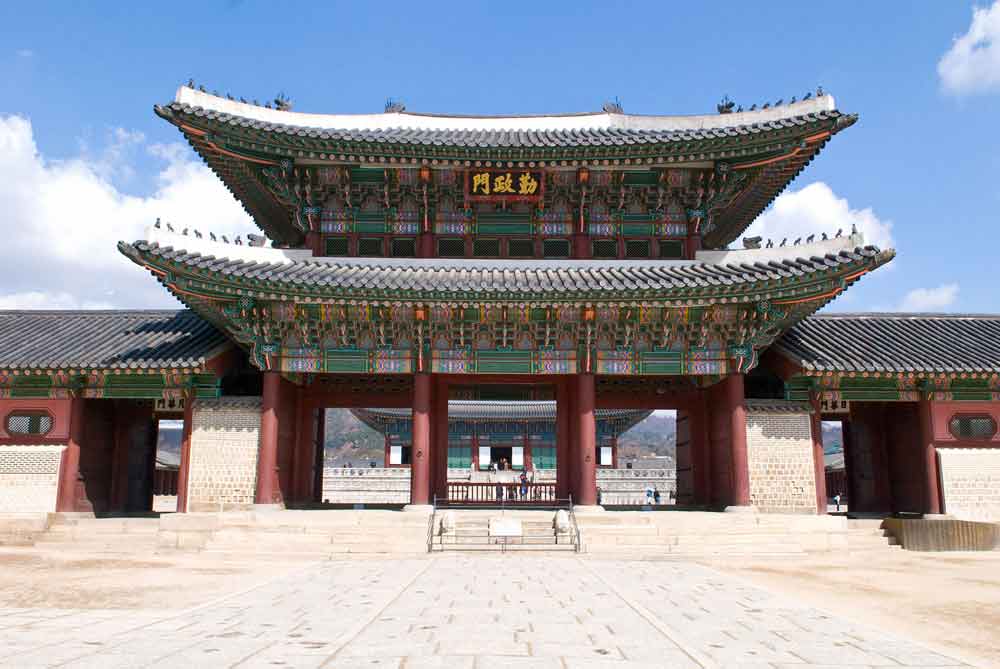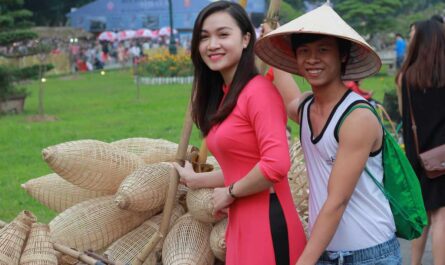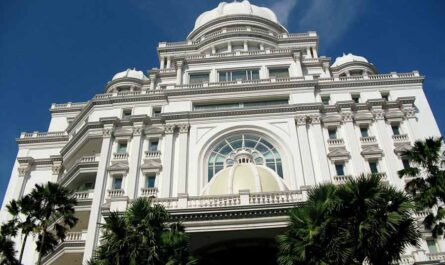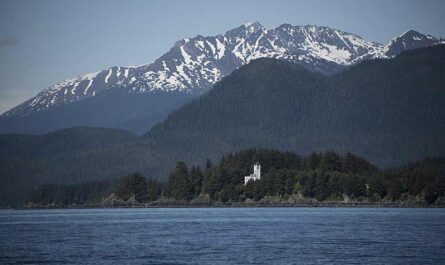Gyeongbokgung Palace is one of the masterpieces in South Korea with a long history. A man is dressed in a royal robe made of crowned silk on his head, bowing down in front of the audience in a manner of honor and praise. His elegance, his elegance, his body language, and his face mimic the brightness of the sun. He reaches the throne all the way, gives a slight hint of sitting there, and tells the audience to sit down. You must have seen it somewhere in K-drama, a famous historical theme.
This historic Palace transcends its role as a historical relic; it stands tall as a symbol of resilience, cultural richness, and the enduring spirit of the Korean people. The meticulous restoration after adversity, the visionary foundations laid by King Taejo, and its status as Seoul’s premier tourist attraction collectively weave a narrative that beckons visitors to immerse themselves in the grandeur of Korea’s past.
Interesting Facts about Gyeongbokgung Palace, ROK
Gyeongbokgung, with its awe-inspiring architecture and historical significance, remains a jewel in the crown of Seoul, inviting all to witness and appreciate its enduring grandeur. Several courts, Yunus, palace ladies, various luxuries, and palaces. Wondering about the palaces, we are about to fly to the Kingdom of the Kings of Joseon; Gyeongbokgong Palace:
1. Gyeongbokgung Palace: A Historical Marvel
Gyeongbokgung Palace, a majestic architectural masterpiece, stands as a testament to Korea’s rich history and enduring legacy. It is not merely a structure; it encapsulates the essence of the Joseon dynasty and the resilience of a nation. Among the five palaces, Gyeongbokgung reigns supreme, holding the title of the largest and arguably the most breathtaking.
Resilience Amidst Adversity
The palace faced the harsh trials of history during the Imjin War (1592-1598), succumbing to the ravages of fire. Yet, like a phoenix rising from the ashes, the visionary leadership of Heungseondaewongun led to the meticulous restoration of the entire palace complex during the reign of King Gojong (1852-1919). This resurgence not only reconstructed the physical structures but also symbolized the unwavering spirit of the Korean people.
The Genesis and Evolution
Gyeongbokgung’s roots delve into the annals of 1394 when King Taejo, the visionary founder of the Joseon dynasty, laid the foundation. The palace owes its name, “Palace Greatly Blessed by Heaven,” to the sagacity of Jeong Do-jeon, a prominent government minister. Through subsequent reigns, namely those of King Taejong and the illustrious King Sejong the Great, the palace underwent a series of expansions, each phase contributing to its grandeur.
2. Seoul’s Crown Jewel: Gyeongbokgung Palace
Gyeongbokgung Palace isn’t just a relic from the past; it’s a thriving hub of tourism in Seoul, capturing the imaginations of visitors with its regal charm. Nestled in an auspicious location between two mountains, the name itself reflects the belief in heavenly blessings bestowed upon this architectural gem.
Intricately designed structures and sprawling courtyards transport visitors back in time, allowing them to envision the opulence and grandeur that once characterized the Kingdom of Joseon. The palace becomes a living testament to the artistic prowess and cultural sophistication of an era bygone.
Embrace the opportunity to wander through the hallowed halls, where the echoes of centuries-old footsteps resonate. Gyeongbokgung stands as a silent narrator, whispering tales of royal intrigues, cultural milestones, and the ebb and flow of a nation’s fortunes.
3. The Magnificent Jiang Dynasty Unveiled
The Jiang Dynasty, alternatively referred to as Jiangbokgong or Giangbok, unfurled its grandeur in the annals of history in the year 1394. This resplendent edifice emerged into existence just three years after its inception by the visionary monarch, King Taijo. An architectural marvel that stood as a testament to regal finesse, Gyeongbokgung Palace witnessed significant expansions during the illustrious reigns of King Taejo and King Sejong, entering an era often hailed as the Great Times.
4. Gyeongbokgung Palace: A Tapestry of Heavenly Majesty
Gyeongbokgung Palace, the jewel in the crown of the Jiang Dynasty, bore the evocative name of Jiangbokgong. Translated, it encapsulates the profound meaning of “Palace dedicated by the paradise of the great heavens.” Nestled amidst the breathtaking landscape, with Mount Bogaksan as its backdrop and the majestic Namsan Mountain standing sentinel at its forefront, the palace was a harmonious blend of architectural brilliance and natural splendor.
5. The Shifting Capitals and the Rise of Seoul
Upon the culmination of the construction of the main palace, Jiangbokgung, a momentous decision altered the course of the Joseon dynasty. The throbbing heart of governance shifted from Gesong to Seoul, later reverting to its original name, Hanyang. This strategic move cemented Seoul’s enduring status as the capital, a position it continues to hold with unwavering pride. The echoes of this pivotal decision resonate through the corridors of history, encapsulating a saga of regal relocations and the enduring legacy of the Jiang Dynasty.
6. Geunjeongjeon: The Throne Corridor of Historical Significance
Geunjeongjeon, a majestic structure also referred to as Geunjeongjeon Hall, served as the sanctum where the ruler of the Joseon dynasty held court, bestowing audiences upon his officials, delivering proclamations of national import, and extending greetings to foreign envoys and ambassadors. This architectural marvel, with its profound historical relevance, was accorded the prestigious title of Korea’s National Treasure No. 223 on January 8, 1985. A bastion of power, Geunjeongjeon stands as a testament to the rich tapestry of Korean history.
7. Geunjeongmun: The Grand Gateway to Royal Authority
Inextricably linked to Geunjeongjeon, Geunjeongmun stands proudly to the south, serving as the primary gateway to the courtyard and the esteemed throne corridor. This architectural marvel, divided into three distinct aisles, permitted only the monarch to traverse the central path, underscoring the hierarchical structure inherent in the royal proceedings. The very essence of regal authority echoes through the grandeur of Geunjeongmun, an architectural masterpiece that stood witness to pivotal moments in the Joseon dynasty.
8. Gyeongbokgung Palace: A Phoenix Rising from Ashes
The tumultuous history of Gyeongbokgung Palace paints a vivid narrative of destruction and resurrection. Originally ravaged by fire in 1553, the palace underwent a meticulous reconstruction from 1592 to 1598, only to face annihilation once more during the Japanese invasion. Rising from the ashes, the palace witnessed a transformation from its original wooden form to a concrete structure, only to reclaim its authenticity with the restoration of a genuine pinewood construction in August 2010. Gyeongbokgung stands as a resilient symbol of Korea’s enduring spirit.
9. Gwanghwamun Plaza: Where History Meets Modernity
The expansive expanse in front of Gyeongbokgung Palace, known as Gwanghwamun Plaza, serves as a vibrant crossroads where the echoes of history harmonize with the pulse of modern life. This bustling plaza, adorned with a palpable sense of casual elegance, beckons visitors to stroll leisurely amidst its open spaces. Here, beneath the watchful gaze of Gyeongbokgung, people meander, creating a contemporary tableau against the backdrop of historical grandeur. Gwanghwamun Plaza encapsulates the fusion of past and present, a living testament to the enduring allure of Korea’s cultural heritage.

10. Gyeonghoeru Pavilion: A Regal Legacy
Gyeonghoeru, a captivating architectural masterpiece also known as Gyeonghoeru Pavilion, stands as a testament to the opulence and grandeur of the Joseon Dynasty in Korea. It has been bestowed the prestigious title of Korea’s National Treasure No. 224, a recognition earned on January 8, 1985, highlighting its historical significance.
11. A Tapestry of Time: Origins and Resilience
The roots of Gyeonghoeru trace back to 1412, during the 12th year of King Taejong’s reign. However, the ravages of the Japanese invasions in 1592 left the initial structure in ashes. Undeterred by adversity, a phoenix emerged from the ashes, and the present Gyeonghoeru was meticulously reconstructed in 1867, under the reign of King Gojong. This resplendent pavilion now graces an artificial, rectangular lake, sprawling 128 meters wide and 113 meters across.
12. Gyotaejeon Hall: Where Royalty Resides
Gyotaejeon, an architectural jewel also known as Gyotaejeon Hall, unfolds as the primary residence for the queen during the Joseon Dynasty. Nestled discreetly behind Gangnyeongjeon, the king’s quarters, this majestic edifice encompasses the queen’s bedchamber, weaving a tapestry of royal life. Its inception dates back to the regal era of 1440, during the 22nd year of King Sejong the Great.
13. A Monarch’s Considerate Design
The pages of history reveal King Sejong’s insightful decision-making, particularly regarding his frail health. Opting to conduct his governmental duties in Gangnyeongjeon, where his bedchamber resides, rather than Sajeongjeon, the monarch inadvertently created a scenario where numerous government officials routinely traversed Gangnyeongjeon, disrupting the sanctity of his abode. In response to this delicate matter, King Sejong, ever mindful of his queen’s privacy, orchestrated the construction of Gyotaejeon, carving out a haven for regal solitude.

14. Sajeongjeon: The Seat of Royal Governance
Sajeongjeon, also known as Sajeongjeon Hall, stands as a testament to its pivotal role as the primary executive office during the illustrious Joseon Dynasty. Positioned discreetly behind the majestic Geunjeongjeon Hall, this architectural marvel served as the epicenter where the king executed his governmental duties and convened high-stakes meetings with esteemed authorities. It exudes historical significance, painting a vivid picture of a bygone era where power dynamics and state affairs unfolded within its hallowed walls.
Flanking the western and eastern peripheries of Sajeongjeon are the two distinct side structures, Cheonchujeon and Manchunjeon. These edifices, strategically placed, play a vital role in the overall functionality of the complex. Interestingly, while the main hall lacks the modern comfort of a heating system, the side buildings are equipped with Ondols, ingeniously designed to combat the chill of the colder months, further emphasizing the architectural ingenuity of the period.
15. Gangnyeongjeon: A Palace of Regal Abode
Gangnyeongjeon, or Gangnyeongjeon Hall, emerges as a poignant symbol of the king’s fundamental living quarters within the grand tapestry of Gyeongbokgung. Its origins trace back to the year 1395 during the reign of King Taejo, marking its inception as a sanctuary for the royal resident. However, the annals of history recount the harrowing events of its destruction during the Japanese invasions of Korea in 1592.
A phoenix rising from the ashes, the reconstruction of Gangnyeongjeon in 1867 faced another tumultuous trial when a ravaging fire engulfed it in November 1876. Undeterred, and under the directive of King Gojong, the resilient structure was reborn in 1888. Each pillar and beam of Gangnyeongjeon whispers tales of resilience, a testimony to the enduring spirit that defines the legacy of Gyeongbokgung.
16. Hyangwonjeong: A Tranquil Haven on Water
Hyangwonjeong Pavilion, an ethereal two-story hexagonal marvel, graces the palace grounds with its serene presence. Commissioned in 1873 by the visionary King Gojong during the construction of the Geoncheonggung residence, this pavilion adds a touch of enchantment to the northern expanse of Gyeongbokgung.
Situated upon an artificial island adorning the Hyangwonji lake, Hyangwonjeong is a poetic embodiment of delicate fragrance and timeless beauty. The Chwihyanggyo Bridge, an elegant connection to the mainland, enhances the pavilion’s allure. Its name, loosely translated as the “Pavilion of Far-Reaching Fragrance,” evokes a sense of poetic romanticism, while the Chwihyanggyo, or “Bridge Intoxicated with Fragrance,” adds a layer of metaphorical resonance to this captivating scene.
17. Historical Context and Purpose of Jibokjae
Jibokjae, an architectural gem adjacent to the Geoncheonggung Residence, stands as a testament to the intricate history of Gyeongbokgung Palace. Its origin traces back to a pivotal moment in 1876 when a devastating fire engulfed the palace grounds, prompting King Gojong to temporarily relocate to Changdeokgung Palace. During this period, the monarch sought refuge and solace in the intricately designed Jibokjae, a two-story non-public library.
18. A Transient Move and a Permanent Resettlement
The monarch’s return to Gyeongbokgung in 1888 marked a symbolic homecoming, yet it was not without architectural consequence. In a bold move, King Gojong decided to disassemble the pre-existing Jibokjae structure from Changdeokgung and relocate it to its present site in 1891. This relocation was not merely a logistical endeavor; it was a meticulous effort to preserve and reinstate a piece of royal heritage.
19. Jibokjae: Unveiling the “Hall of Collecting Jade”
The nomenclature of Jibokjae, loosely translated as the “Hall of Collecting Jade” in English, carries profound significance. It beckons to an era when the collection and appreciation of jade held cultural and aesthetic value. The very essence of this name encapsulates the regal ambiance that the library exudes, hinting at the treasures of knowledge contained within its walls.
20. A Fusion of Cultures in Architectural Splendor
Jibokjae’s architectural allure lies in its departure from traditional Korean palace structures, embracing a distinctive blend of Chinese influences. The meticulous construction reveals a heavy reliance on Chinese architectural elements. Notably, the use of brick in the side walls, a technique prevalent in contemporary Chinese architecture, deviates from the established norms of Korean palace construction.
21. Chinese Architectural Flourishes: From Roof to Columns
The embodiment of Chinese architectural nuances extends beyond the walls, infiltrating the very core of Jibokjae. The roof formations, interior screens, and columns proudly showcase their Chinese lineage. Each element seems meticulously chosen to infuse the structure with a unique visual identity, transcending the boundaries of conventional palace architecture.
22. Chwihyanggyo: A Wooden Odyssey
Chwihyanggyo, the enchanting wooden bridge adjacent to Hyangwonjeong, unfolds a saga of resilience and reconstruction. Originally situated on the northern periphery of the island, this marvel was once the longest wooden bridge of the Joseon dynasty, a testament to the craftsmanship of a bygone era. Tragically, the ravages of the Korean War claimed its existence.
In a poignant rebirth, the bridge was reconstructed in 1953 on the southern side of the island, showcasing the determination to preserve heritage amidst adversity. Presently, a meticulous effort is underway to relocate Chwihyanggyo to its original northern abode, a restoration project poised to conclude in 2019. This bridge, both a witness to history and a symbol of resilience, mirrors the undying spirit that echoes through the corridors of Gyeongbokgung.
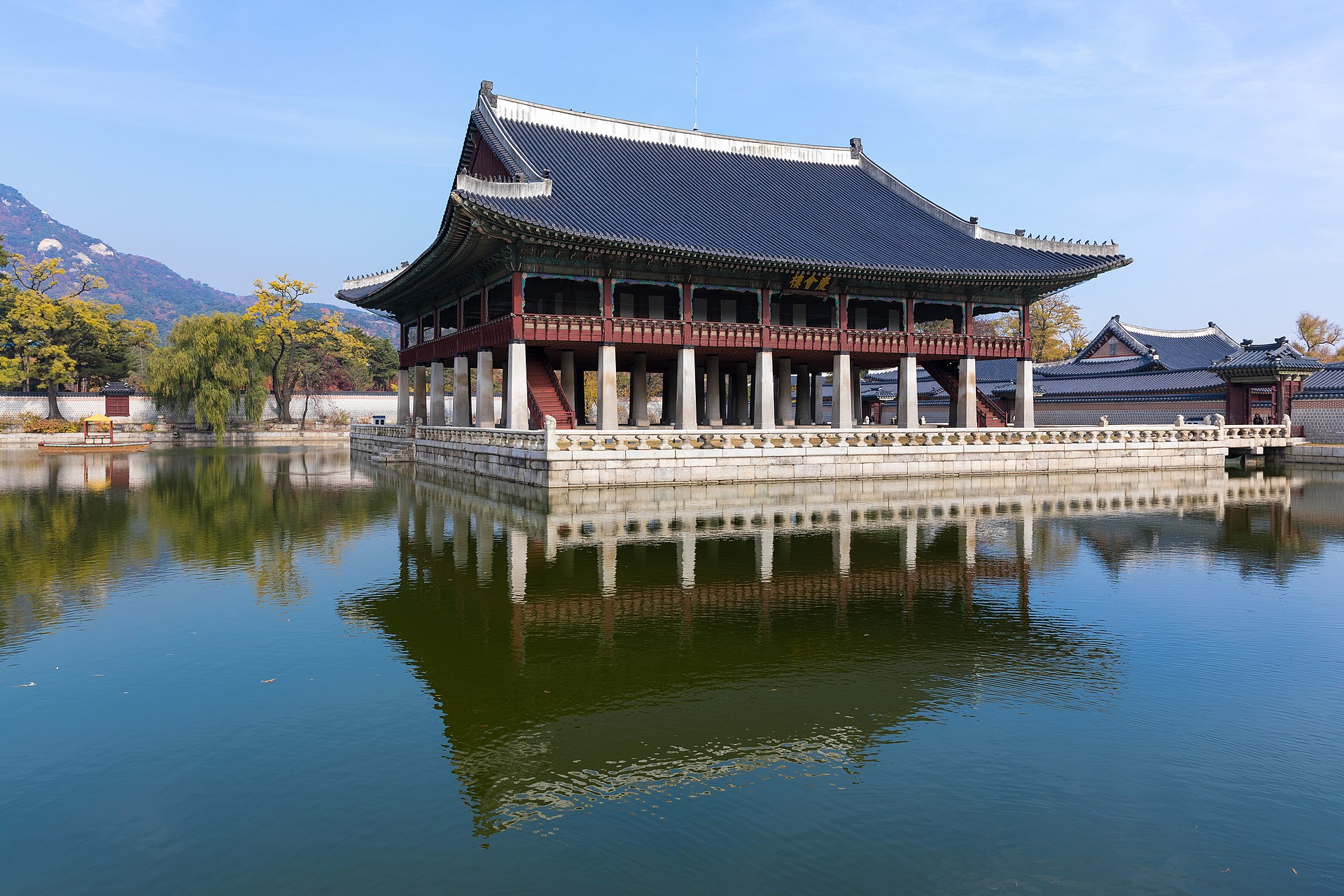
23. Gyeonghoeru Pavilion: A Stately Journey Through Joseon Dynasty Banquets
Gyeonghoeru, a grandiose pavilion resonating with historical significance, served as the ceremonial corridor for hosting essential state banquets during the illustrious reign of the Joseon Dynasty. This architectural masterpiece, affectionately known as the Gyeonghoeru Pavilion, secured its esteemed position by being officially recognized as Korea’s National Treasure No. 224 on January 8, 1985. Imbued with the regality of a bygone era, Gyeonghoeru stands as a testament to the cultural and architectural prowess of its time.
24. Jagyeongjeon Hall: A Resilient Relic of Royal Residence
Jagyeongjeon, colloquially referred to as Jagyeongjeon Hall, emerges from the annals of history as the primary dwelling place of Queen Sinjeong, a notable matriarch during the reign of King Heonjong. The edifice, first erected in 1865, encountered the fiery tribulations of destruction not once but twice, succumbing to the ravages of flames. However, like a phoenix rising from the ashes, it underwent meticulous reconstruction in 1888, standing today as a testament to architectural resilience.
25. Jagyeongjeon’s Triumph Over Adversity
Jagyeongjeon stands as a solitary survivor amid the tumultuous demolition campaigns orchestrated by the Japanese government during their occupation of Korea. Escaping the fate that befell many historical structures, this royal dwelling defiantly retained its regal charm, weathering the storms of external influence. It stands not only as a testament to architectural grandeur but also as a symbol of historical tenacity in the face of adversity.
26. Intricate Symbolism of Jagyeongjeon’s Design
The chimneys that grace the skyline of Jagyeongjeon are not mere architectural elements; they are intricate canvases bearing ten signs of longevity. This adorned symbolism serves as a poignant wish for an enduring and prosperous life for the late queen. As one traverses the west walls of the Jagyeongjeon compound, they are greeted by a tapestry of floral designs, each petal and leaf whispering tales of the beauty and grace that once permeated these regal quarters.
27. Seasons Encapsulated in Jagyeongjeon’s Architecture
Journeying through the corridors of Jagyeongjeon unveils a thoughtful architectural embrace of Korea’s seasonal nuances. The protruding southeast facet, aptly named Cheongyeollu, extends a cooling sanctuary during the scorching summer months. Contrastingly, the northwest counterpart, Bokandang, stands as a haven of warmth and comfort, tailored for the unforgiving winter. Meanwhile, the eastern section, Hyeopgyeongdang, distinguished by its lowered stature, served as the domain for the late queen’s trusted assistants—a nuanced orchestration of architectural functionality and royal hierarchy.
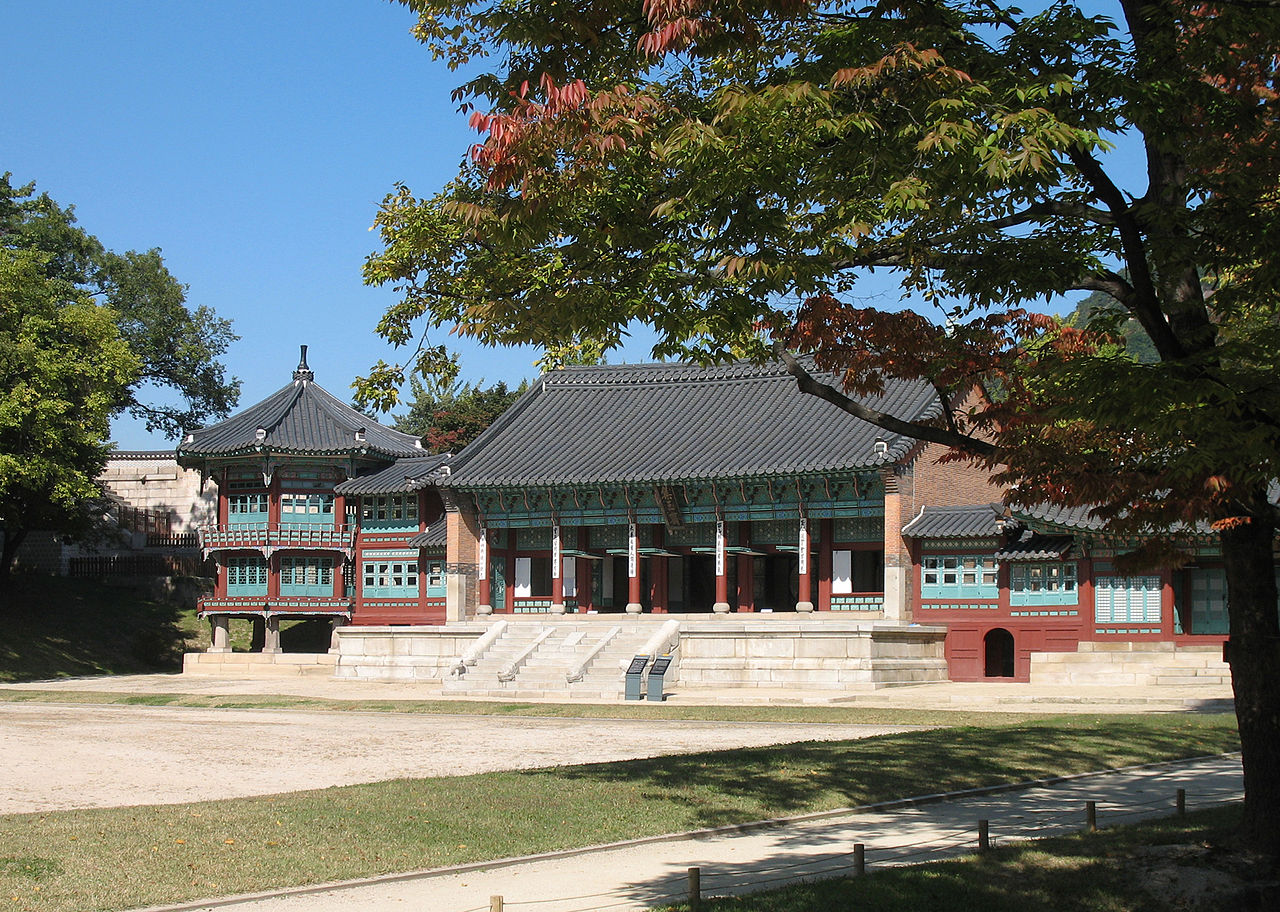
28. Jibokjae and Its Surroundings
Jibokjae, a remarkable structure, stands proudly between two significant edifices – Parujeong on the left and Hyeopgildang on the right. Parujeong, an octagonal two-story pavilion, was meticulously crafted with the purpose of housing an extensive collection of books. In contrast, Hyeopgildang, positioned to the right of Jibokjae, served a dual role, acting both independently and as an integral part of the larger architectural ensemble. What adds to the mystique of these structures is the intricate internal linkage that binds them to Jibokjae, creating a seamless flow of historical significance.
29. Historical Loss: Bohyeondang and Gahoejeong
The narrative takes a somber turn when we delve into the history of Bohyeondang and Gahoejeong, two architectural gems that once formed part of a library complex to the south of Jibokjae. Unfortunately, their fate was sealed by the Japanese authorities in the early 20th century, who, in an act of cultural erasure, decided to demolish these invaluable structures. The loss of these buildings not only deprived future generations of tangible connections to the past but also left a void in the historical landscape that echoes with the whispers of what once was.
30. Donggung: A Historical Abode for Royalty
Nestled south of the enchanting Hyangwonjeong pavilion, Donggung stands as a testament to regal elegance, having served as the dwelling for both the crown prince and his consort. Comprising four essential edifices — Jaseondang and Bihyeongak, Chunbang (the scholarly sanctum where the prince immersed himself in preparatory education for his destined role as a monarch), and Gyebang (the fortress-like protective structure) — Donggung resonates with the echoes of royal history.
As shadows of the 19th century danced through the air, Emperor Sunjong found solace within the confines of this compound. However, the serenity was shattered during the harsh Japanese occupation, leading to the utter devastation of Donggung. The arduous journey of restoration commenced in 1999, and to this day, only Jaseondang and Bihyeongak have emerged from the cocoon of time, painstakingly reconstructed to echo the grandeur of their bygone era.
31. Geoncheonggung: A Royal Residence Shrouded in Tragedy
Geoncheonggung, also known as the Geoncheonggung Residence, stands as a poignant reminder of King Gojong’s sanctuary within the palace grounds, its foundations laid in 1873. The regal corridors of Geoncheonggung echoed with the footsteps of King Gojong from 1888 onwards, as the residence underwent continual expansions. However, the annals of history marked October 8, 1895, with a tragedy that left an indelible scar on Geoncheonggung.
Empress Myeongseong, the beloved consort of King Gojong, met a gruesome fate within the residence, brutally assassinated by Japanese agents. Her remains, consumed by fire, found their final resting place near the hallowed halls of Geoncheonggung. Haunted by the specter of this traumatic incident, King Gojong, in January 1896, abandoned the palace, never to return to the residence again. Though ruthlessly demolished by the Japanese government in 1909, the phoenix of reconstruction rose, restoring Geoncheonggung to its former glory and unveiling its tragic tale to the public in 2007.
32. Intricacies of Design and Cultural Resurgence: A Glimpse into Restoration Efforts
The meticulous restoration of Donggung and Geoncheonggung stands as a cultural odyssey, weaving together fragments of history with threads of architectural resilience. The restoration endeavors, initiated in 1999 for Donggung and culminating in 2007 for Geoncheonggung, showcase the commitment to preserving the intricate designs and historical narratives encapsulated within these regal structures.
From the ornate detailing of Jaseondang to the expansive grandeur of Geoncheonggung, each restoration breathes life into the heritage, allowing visitors to traverse the corridors of time. The amalgamation of traditional craftsmanship and contemporary conservation techniques renders these sites not mere relics, but living monuments that bridge the chasm between past and present.
33. Unveiling the Past: Donggung and Geoncheonggung Today
Presently, Donggung beckons visitors with the restored splendor of Jaseondang and Bihyeongak, offering a glimpse into the opulence that once graced the living quarters of royalty. The compound stands as a dynamic canvas, where the brushstrokes of history blend seamlessly with the vibrancy of contemporary restoration efforts.
On the other hand, Geoncheonggung, rising from the ashes of demolition, invites exploration into the tragic chronicles of King Gojong and Empress Myeongseong. Open to the public since 2007, this reconstructed residence serves not only as a historical edifice but also as a poignant testament to resilience in the face of adversity.
In conclusion, Donggung and Geoncheonggung stand as architectural emissaries, narrating tales of regality, tragedy, and resurrection. These historical gems, meticulously restored, serve as portals to a bygone era, inviting modern explorers to traverse the corridors of time and connect with the rich tapestry of Korean history.
34. Resilience and Restoration: Taewonjeon Shrine
In the shadows of historical adversity, the Taewonjeon Shrine emerges as a symbol of resilience and cultural continuity. Initially erected in 1868, this ancestral shrine was dedicated to housing a portrait of King Taejo, the illustrious founder of the Joseon dynasty. Furthermore, it served as the sacred space for performing rites to honor the departed royalties.
However, the shrine faced a devastating fate at the hands of the Japanese authorities in the early 20th century. Remarkably, in 2005, a meticulous restoration effort breathed life back into the shrine, resurrecting it to its former glory. The revival of Taewonjeon stands as a testament to the indomitable spirit of preserving cultural heritage against the odds.

35. Gyeongbokgung’s Historical Backyard Evolution
Once encompassing the paramount segment of the Japanese Governor-General’s residence, the rear garden of Gyeongbokgung Palace bears witness to a complex historical transformation. This transformation unfolded during the early 20th century under the shadows of Japanese occupation. As an emblem of foreign dominance, the residence played a pivotal role in the power dynamics of the time. The ebb and flow of history, however, saw a shift in the purpose of this space with the establishment of the Republic of Korea in 1948. President Syngman Rhee repurposed it to serve as both his official workspace and private abode.
36. Erasing Symbols: The Dismantling of Japanese Colonial Legacy
In the annals of 1993, a significant chapter unfolded as President Kim Young-sam’s civilian administration took charge. In a decisive move to sever ties with the remnants of Japanese colonialism, the Japanese Governor-General’s residence within the Cheongwadae compound faced dismantlement. This strategic act aimed not only to alter the physical landscape but also to eliminate a potent symbol of historical subjugation. The removal of this architectural relic marked a symbolic step towards a Korea redefined by its sovereignty and independence.
37. Sujeongjeon: A Silent Witness to Dynastic Governance
Nestled to the south of Gyeonghoeru, Sujeongjeon emerges as a silent testament to the administrative prowess of the Joseon dynasty. Constructed in 1867, this edifice served as the nerve center for the dynasty’s cabinet. Its architectural grandeur mirrored the political and cultural richness of its time. Within its walls, decisions that shaped the course of history were deliberated upon, making Sujeongjeon an integral part of Gyeongbokgung’s historical narrative.
38. Gyeongbokgung Palace: A Restoration Effort
The government, with unwavering determination, has dedicated substantial resources and energy to the meticulous restoration of the Gyeongbokgung Palace complex. This architectural marvel stands as a testament to their commitment to preserving and showcasing the rich history of ancient Korea. Crafted with precision, the palace serves as an immersive learning experience, allowing visitors to delve into the depths of Korean heritage and marvel at its grandiose architecture. The pavilions, gates, bridges, and the surrounding wall grounds collectively transport visitors to the era of Josion, providing a vivid glimpse into a bygone era.
39. A Shift in Perspective: Changing of the Guards in Guangzhou
According to a comprehensive survey orchestrated by the Seoul Metropolitan Government, a significant revelation emerged regarding the preferences of visitors to Guangzhou. Astonishingly, the majority of these discerning travelers cited the change in guards at the Gyeongbokgung Palace as their most cherished activity in Seoul. This attests not only to the allure of the palace itself but also to the captivating spectacle that is the changing of the guards ceremony, a highlight that resonates deeply with those seeking an authentic and immersive experience in the heart of Seoul.
40. The Symbolism of Pavilion Awnings
Delving into the intricate details of the palace’s architecture unveils a fascinating aspect – the symbolism behind the colors of the pavilion’s awnings. A captivating tradition dictates that if the aves of a pavilion are adorned with vibrant colors, it signifies that the space has been claimed by a female member of the royal family. In stark contrast, a gray or dull hue signifies the acquisition by none other than the king himself or other esteemed members of the royal family. This nuanced detail adds an extra layer of intrigue to the palace’s rich tapestry, allowing visitors to decode the historical significance embedded in its very structure.
41. Visitor Sentiments: The Changing of the Guards
In a poll encompassing nearly 2,000 international visitors, orchestrated by the Seoul Metropolitan Government in November 2011, a compelling revelation came to light. The altering of the guards at the fundamental gate, Gwanghwamun, emerged as the third most favored activity among these global explorers in Seoul. This hourly ceremony, held in front of the primary gate from 10:00 to 15:00, captures the collective imagination of visitors, offering a mesmerizing spectacle that transcends cultural boundaries. It solidifies the changing of the guards as a universal attraction, drawing people from diverse backgrounds to witness this captivating display of tradition and ceremony.
42. Timeless Elegance: Hanbok-Wearing Tourists at Gyeongbokgung
Adding a timeless and elegant touch to the vibrant tapestry of Gyeongbokgung’s visitors are those who choose to immerse themselves fully in the experience by donning traditional hanbok attire. A charming scene unfolds as numerous tourists, adorned in the colorful and graceful hanbok, wander through the palace grounds. The allure of this cultural immersion extends beyond the palace gates, with rental outlets conveniently located nearby, allowing visitors to embrace the spirit of ancient Korea in both style and substance.
43. Rise from the Ashes: Gyeongbokgung’s Resilience
Gyeongbokgung Palace’s resilience echoes through the ages, particularly in the aftermath of devastating fires. Initially destroyed and rebuilt under the reign of King Myungjiang, the palace faced another conflagration that left it abandoned for three centuries. The phoenix-like revival occurred during the reign of Dawanggun when the palace was reconstructed, testifying to the enduring spirit that courses through Gyeongbokgung’s storied past.
44. Royal Exile and Liberation: A Prolonged Rebuilding Odyssey
The year 1895 marked a somber turning point for Gyeongbokgung as Emperor Miangsiang fell victim to Japanese agents. This tragic event cast a long shadow, leading to the royal family’s prolonged absence from the palace. Liberation brought a glimmer of hope, yet it took four decades for the government to initiate the arduous task of rebuilding. This protracted hiatus only amplifies the layers of history and resilience embedded in the heart of Gyeongbokgung Palace.
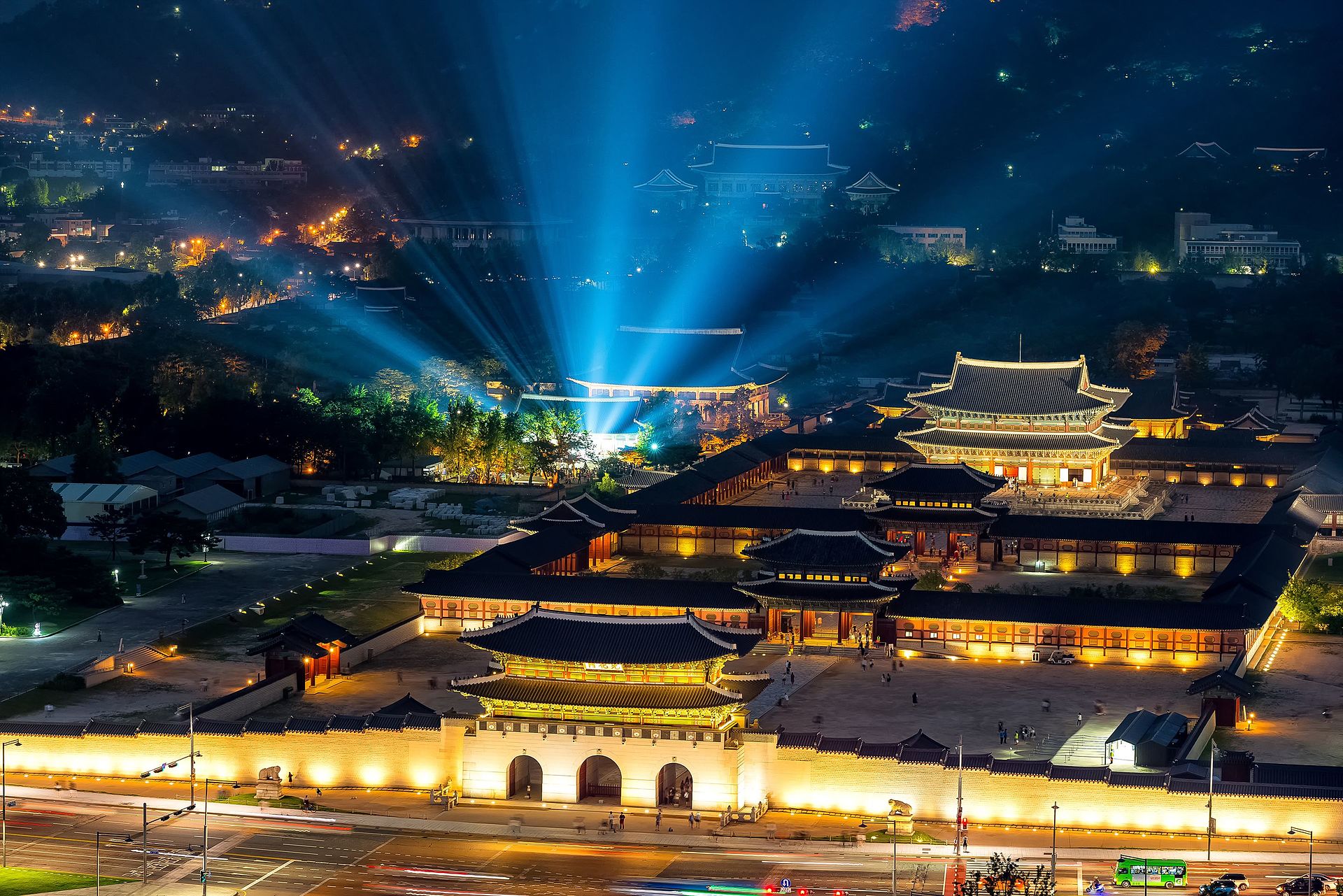
45. Gyeongbokgung Palace: A Historical Marvel
Gyeongbokgung Palace, situated in the heart of Seoul, South Korea, stands as a living testament to the nation’s rich history. Its significance is not only rooted in its architectural magnificence but also in its role as a cultural hub. Today, the palace is not just a relic of the past; it’s a vibrant space open to the general public, housing the National Folk Museum of Korea, the National Palace Museum of Korea, and breathtaking traditional Korean gardens.
46. Affordable Elegance: Admission Details
To traverse the grandeur of Gyeongbokgung Palace comes at an affordable cost. The admission fee for adults is a modest maximum of 3000 won, roughly equivalent to a mere $2.5. For children, the cost is even more budget-friendly, standing at $1500, which translates to a mere $1.3. This accessibility ensures that the historical and cultural treasures within the palace are open for exploration to a diverse range of visitors.
47. Gyeongbokgung Palace: A Cinematic Backdrop
For enthusiasts of Korean historical dramas and films, Gyeongbokgung Palace is more than a historical site – it is a cinematic marvel. Jiangbokgung Palace, with its regal ambiance, serves as the backdrop for numerous iconic scenes in popular K-dramas. From the ethereal world of Goblin to the romantic allure of My Sassy Girl and the emotional depth in The Legend of the Blue Sea, the palace has played a starring role in captivating audiences worldwide. Travel essentials, accessories, kit & items on Amazon
48. Gyeongbokgung Palace Location and Accessibility
Nestled in the heart of Seoul, the regal Gyeongbokgung Palace stands as a testament to Korea’s rich history and cultural heritage. Located at 22 Sajik-ro, Jongno-gu, the palace serves as a captivating architectural marvel, drawing inquisitive visitors from around the globe. Its geographical allure is enhanced by the convenient proximity of the Gyeongbokgung Station, designated as Station #327 on Line 3 of the city’s efficient subway network.
49. Subway Station Proximity and Connectivity
Navigating the bustling urban landscape of Seoul is a seamless endeavor when one opts for the Gyeongbokgung Station, strategically positioned to provide easy access to the majestic palace. As the arteries of the city, Seoul’s subway lines intricately weave through its cultural tapestry, and Gyeongbokgung Station, as part of Line 3, emerges as a crucial hub in this intricate web of connectivity. The subway, a lifeline for commuters and tourists alike, effortlessly links the contemporary heartbeat of the city with the historical pulse of Gyeongbokgung Palace.
50. Visionary Plans for Transportation Expansion
A dynamic facet of Seoul’s urban planning comes to the forefront in the tantalizing prospect of extending the Shinbundang Line near the resplendent Gyeongbok Palace. The whispers of this transformative endeavor first gained momentum during a spirited March 2012 campaign promise by Hong Sa-duk, underscoring the city’s commitment to progress and modernization. This on-and-off discussion, like the ebb and flow of tides, symbolizes the delicate dance between preserving historical charm and embracing the contemporary demands of a thriving metropolis. Ticket for Events
51. The Intriguing Promise of Line Expansion
The allure of progress beckons with the tantalizing possibility of the Shinbundang Line extending its reach near Gyeongbok Palace. This envisioned expansion is more than just the laying of tracks; it is a symbolic bridge between Seoul’s storied past and its promising future. As commuters traverse the expanded subway lines, they become unwitting participants in the city’s ongoing narrative, where heritage and innovation coalesce to create a tapestry that seamlessly interweaves the old and the new. In the delicate balance of tradition and transformation, Gyeongbok Palace remains a steadfast witness to Seoul’s perpetual evolution.
52. Resilience Amidst Adversity: Survival Through Demolition
The early 20th century marked a tumultuous period for Gyeongbokgung Palace as it faced the wrath of the Japanese occupation. Devastatingly, around 90% of the site succumbed to demolition during this challenging era. However, amid the destruction, the resilient core of Gyeongbokgung persevered. Key structures such as Jianjongzione (Imperial Throne Hall), Gianghyaru Pavilion, Hyangjiang Pavilion, Zagyongjion Hall, Jibokje Hall, Szeongjion Hall, and Sujiangjion Hall endured the onslaught, standing as stoic witnesses to history. Traveloka: Southeast Asia’s Leading Travel Platform. Best prices for hotels, flights, buses, trains, & attractions
53. Gyeongbokgung Palace Today: A Fusion of Past and Present
Despite the scars of its tumultuous past, Gyeongbokgung Palace today stands as a captivating blend of historical remnants and contemporary vibrancy. Visitors not only get a glimpse into the majestic past of Korea but also witness the nation’s commitment to preserving its cultural heritage. Through meticulous restoration and preservation efforts, Gyeongbokgung Palace invites us to embark on a journey through time, immersing ourselves in the grandeur and resilience that define this cultural gem.
Other recommended Reading
- 100 Tallest Completed Buildings in the World
- 15 Interesting Louvre Museum Facts to Know
- 30 Interesting Facts about Abu Dhabi Tourism
- 20 Interesting Switzerland Facts One Should Know
- 26 Interesting Great Pyramid of Giza Facts
- 12 Persian Empire Facts and Achievements
- El Salvador History – How the Country Moves On
- History of Latin America – Twists and Thrills
- Spanish Colonization of the Americas
More Interesting Articles
- 25 California Drought Facts – Causes | Effects | Solution
- 38 Interesting Facts About Australian Flag
- 25 Interesting Facts About The Roman Empire
- 100 Fun Facts About France One Should Know
- 15 Facts About Letchworth State Park, NY
- 40 Amazing Walt Disney World Facts
- 25 Interesting Facts About Glastonbury Festival
- 10 Interesting Facts About Antalya Turkey
- 70 Interesting Facts about the Eiffel Tower
- 26 Facts About Tokyo Meiji Jingu Temple
- 20 Fun Facts about Yosemite National Park, California
- 30 Interesting Facts About Dublin, Ireland
- 57 Must-do Things in Budapest for Travelers
- 13 Interesting Beijing Facts Everyone Must Know
- 16 Facts – Harbin International Ice and Snow Sculpture Festival
- 20 Surprising Facts About The German Flag
- 25 Surprising Facts About Florida Flag
- 17 Interesting Netherlands Facts to Surprise All
- 100 Tallest Completed Buildings in the World
- 15 Interesting Louvre Museum Facts to Know
